Musical (2015)
Music, Lyrics, Book and Orchestrations by Dave Malloy
Directed by Courtney O’Connor
Music Director: Dan Rodriguez
Lyric Stage Company of Boston
Copley Square Area, Boston
January 6 – February 5, 2023
With Aimee Doherty (Dahl), Will McGarrahan (Chekhov, Tchaikovsky, Tolstoy, Glazunov, Tsar Nicholas II, The Master), Anthony Pires, Jr (Chaliapin), Dan Prior (Rach), Dan Rodriguez (Rachmaninoff), Kayla Shimizu (Natalya)
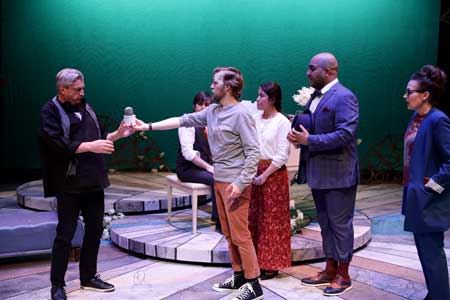
Kayla Shimizu, Anthony Pires, Jr. , Aimee Doherty
in “Preludes”
Photo: Mark S. Howard)
Lovers of great orchestral music know the inspiring Romantic works that Rachmaninoff produced including his great Piano Concertos 2 and 3 and his Rhapsody on a Theme by Paganini. Many of those who would not know these pieces by name would be able to recognize their major themes, their influence is so broad and profound, their themes so captivating. Despite his eventual widespread acclaim, there was a period, before creating his Piano Concerto No. 2 when Rachmaninoff faced writers’ block for three years and consulted a hypnotherapist named Nikolai Dahl to try to break it.
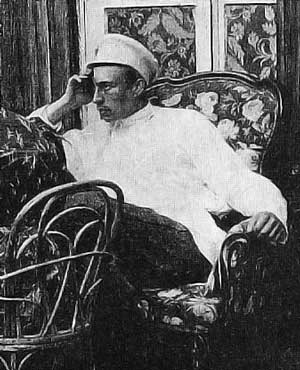
Preludes attempts to depict the course of this crisis and the treatment which eventually helped Rachmaninoff, and does so in sometimes quite interesting ways. The main characters portrayed are the composer and pianist Rachmaninoff (Dan Rodriguez), Rach (Dan Prior) the dramatic analogue of Rachmaninoff the composer, hypnotherapist Dahl (Aimee Doherty), Rachmaninoff’s cousin and betrothed Natalya (Kayla Shimizu), and the supplemental characters Feodor Chaliapin (Anthony Pires, Jr.) and a host of characters including Chekhov, Tchaikovsky, Tolstoy, Glazunov and Tsar Nicholas II all played by Will McGarrahan. The basic context of the narrative is a series of therapy sessions in which Rach consults with Dahl over his many anxieties, while at center stage his musical analogue Rachmaninoff plays away. Along with Rach and Rachmaninoff, Dahl and Natalya are consistently present onstage, while Chaliapin and all of the characters Will McGarrahan portrays zip in and out. The result is a sense of an elusive, but penetrating and ultimately successful, therapy that enables Rachmaninoff to go on to create some of his greatest works.
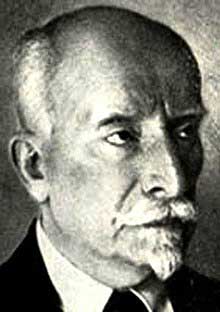
This musical is sort of a musical, but more of a play with music, not attempting to adhere to the typical musical form at all. Engaging at many points in its impressionistic approach to history, it conveys author and composer Malloy’s seriousness, as well as inventiveness, in portraying Rachmaninoff’s challenged life and career. Malloy does embellish the history so that what might have seemed at some points like a purely historical drama gets scrambled with references some undeniably contemporary motifs, and at times he makes use of language that is more twenty-first century American than nineteenth century Russian.
The result is a poignant amalgam that one might take as a mapping of any creator’s challenges and gives a sense of what a composer like Malloy himself might face at times. The account of Rachmaninoff’s very first considerable unexpected success at age nineteen in the early 1890s set expectations high, but was followed in 1895 by a disastrous reception of his First Symphony, which plunged him into the depression and writer’s block that forms the core of the drama in Preludes. Curiously, Malloy’s own career had, just before the release of Preludes, an explosive success in Natasha, Pierre and the Great Comet of 1812, a suggestive, though not exact, parallel.
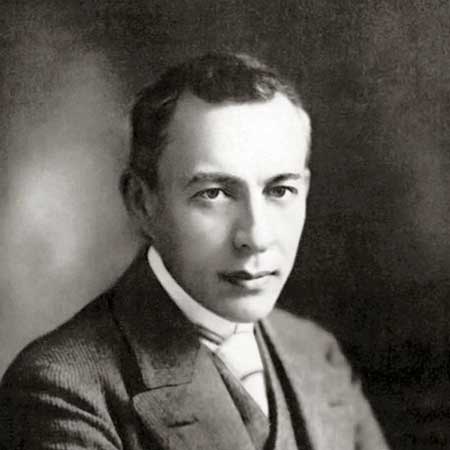
The narrative itself is episodic and impressionistic, and the incidental feel of the music often follows suit. There are extremely lovely and inventive moments in some of the musical numbers, sometimes sung with beautiful voices and harmonies, and done so in cases in which the writing for voice is clearly not easy. There are times when the combination of music and sound design seems a bit odd. Early on in the show there is a thumping or rumbling in the background while Dan Rodriguez plays away on the piano expertly onstage; at first I thought it might have been a broken pipe or an errant noise from the street, but it emerged as an intentional percussive embellishment, perhaps to indicate a heartbeat. There are some other points as well when that curious combination of sound effects from backstage and the music onstage do not go well together.
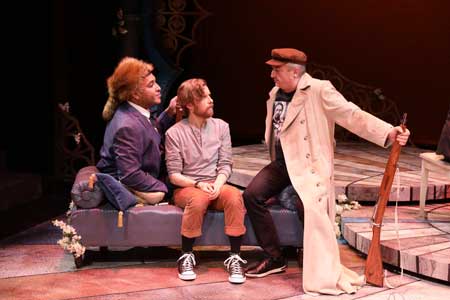
in “Preludes”
Photo: Mark S. Howard)
Throughout, music director and pianist Dan Rodriguez plays a major musical, and implicitly dramatic, role as Rachmaninoff. Rodriguez plays beautifully and almost constantly, and offers an impressive anchor to the production. But there are also points when Dan Prior, Will McGarrahan and Aimee Doherty sit down next to Rodriguez, or sometimes by themselves, and play some, or even more than some, notes. McGarrahan actually plays piano and sings an entire wonderful number himself. And, as though to return the favor, Dan Rodriguez, at the end of the show, belts into song. All this sort of switching is interesting, fun, and exhibits a lot of all-around talent.
The script is inventive and at times persuasive though not consistently brilliant, but the actors are very good and bring a good amount of energy and appeal to the production. Dan Prior, as Rach, is intense and appropriately beset. Aimee Doherty is pretty hilarious and very appealing as hypnotherapist Dahl, but seeming, perhaps intentionally, much more like a twenty-first century therapist than a nineteenth century one. Kayla Shimizu is wonderfully voiced at times and plays an affecting Natalya. Anthony Pires, Jr.’s rich and resounding baritone contributes significantly when he gets to belt it out as the great singer Chaliapin. And the amazingly versatile and competent Will McGarrahan manages to pull of his five or six different roles very competently, in addition to offering that wonderful piano and vocal solo. His portrayal of Tolstoy seemed a little too intense and satirical, but it was hard to tell if that were mostly McGarrahan’s doing or the doing of director O’Connor and/or writer Malloy.
All in all, this is a suggestive and interesting show, not at all in the typical Broadway musical mode and notable and curious for that reason. It’s a daring experiment in historical reflection on artistic anguish, and with its innovative compositional example, presents some truly interesting and offbeat ideas about what non-cookie-cutter musical theater can be.
– BADMan (aka Charles Munitz)
Leave a Reply